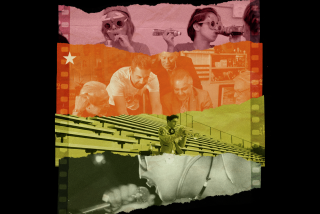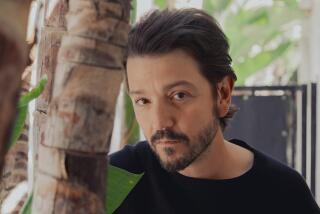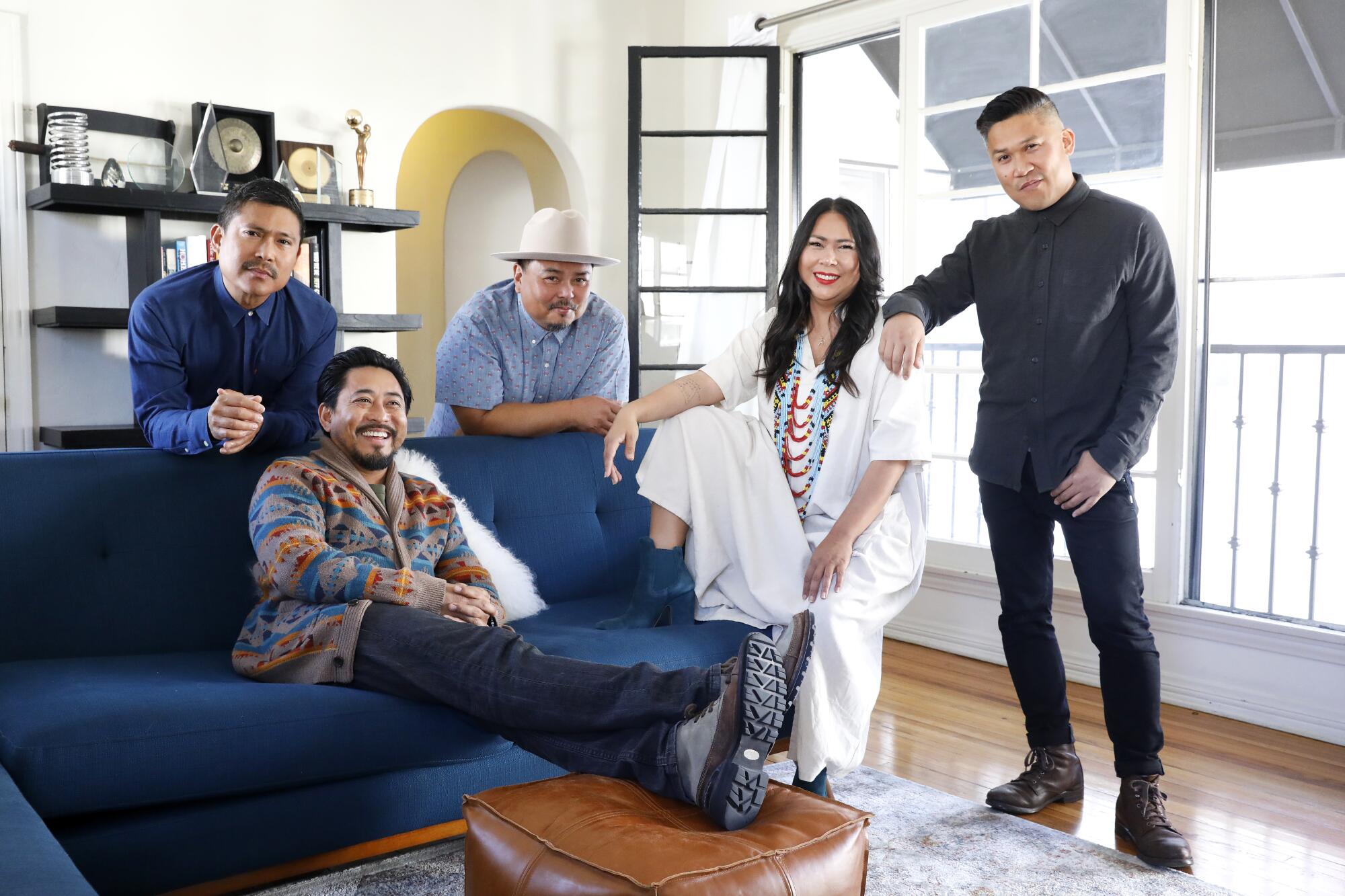
- Share via
Dante Basco wasn’t expecting a green light on a personal project based on his own family. The actor, well known for playing the fiery Rufio in 1991’s “Hook” and Zuko on the hit animated series “Avatar: The Last Airbender,” didn’t even have a script yet.
But for years he’d been developing the saga of four brothers gathered for a wedding — fictional, yet drawn from real events and relationships — that he’d star in alongside his actual brothers Derek, Darion and Dionysio. Conceived with co-writer Darion and set in their Bay Area hometown, its title proudly placed their heritage front and center: “The Fabulous Filipino Brothers.”
Meeting with potential backers in the Philippines, the idea struck a chord. Basco, 46, got a script drafted and was soon helming his own directing debut, an indie labor of love (now out on video on demand) that would bring together family and friends and pay homage to the close-knit Filipino American community that shaped the siblings’ childhoods.
“For so long in our lives, in this industry and in the world as people of color, we were trying to fit into what it is to be American, and a lot of that is watering down or leaving our culture behind,” said the actor, writer, producer and director. “But there’s a time to go, ‘No: Let me dig into who we are. These four Filipino brothers from Pittsburg, California. This is who we are, and these are the stories of our families.’”
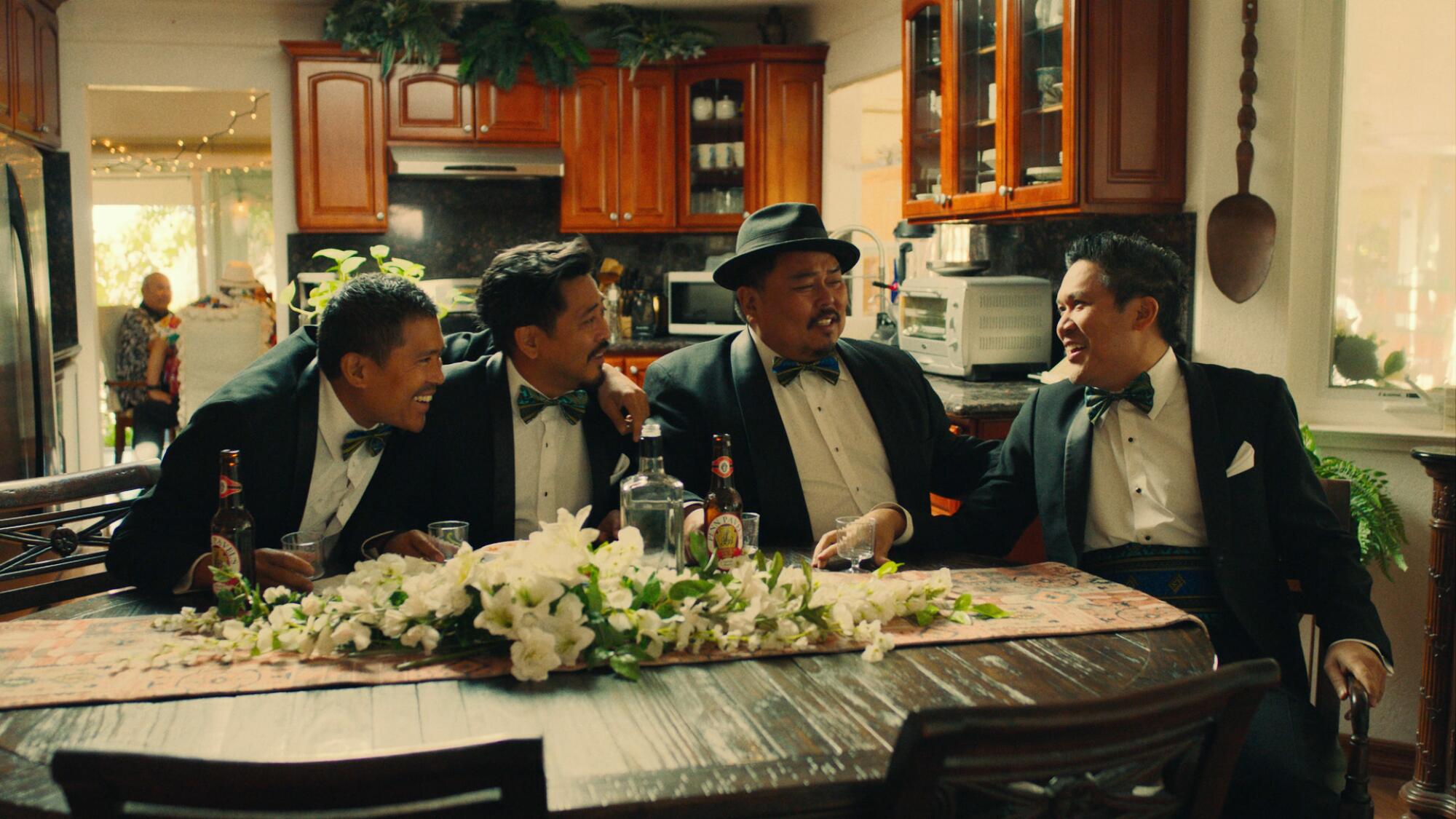
As Asian Americans, the Bascos often try out for the same few roles. So they created their own parts.
Told in four vignettes, the film highlights each of the four grown Abasta brothers as they navigate their own quiet crises leading up to a big family gathering. Living under one roof, they banter and bicker around plates of pandesal and longanisa, go off on their own narratives threads and come back together again, all captured with warmth and humor by cinematographer Andrea Walter (“Empty by Design”), with music by AJ Rafael and a soundtrack boasting artists including Bay Area rapper Ruby Ibarra.
Dayo (Derek Basco) wrestles with self-imposed pressure to provide for the family as the eldest son. Duke (Dante Basco), the golden child, has a life-changing revelation visiting Manila for the first time on business. Danny Boy (Darion Basco) is stuck in a deep depression following a heartbreak, and David (Dionysio Basco), the extremely single youngest brother, makes a surprising love connection when he least expects it.
Even their parents, Darius and Aida Basco, steal scenes as the heads of the fictional family in a cast that includes Liza Lapira, Solenn Heussaff, Cheryl Tsai Perez, Joey Guila and Tirso Cruz III. The film’s secret weapon, however, is the fifth Basco child — fellow artist and filmmaker Arianna — who narrates the seriocomic proceedings and provides the clear-eyed perspective of a sister in a household dominated by men.
For that, Dante and Darion admit, speaking together via videochat, they have their mother to thank. It was over a family dinner, excitedly discussing “The Fabulous Filipino Brothers,” that she asked Dante: “Is your sister in the film?” Writing her in balanced out the story, proving Mom’s instincts right. “[Arianna] is a force of nature,” said Darion, “and she had to be to grow up as a youngest sister with us four.”
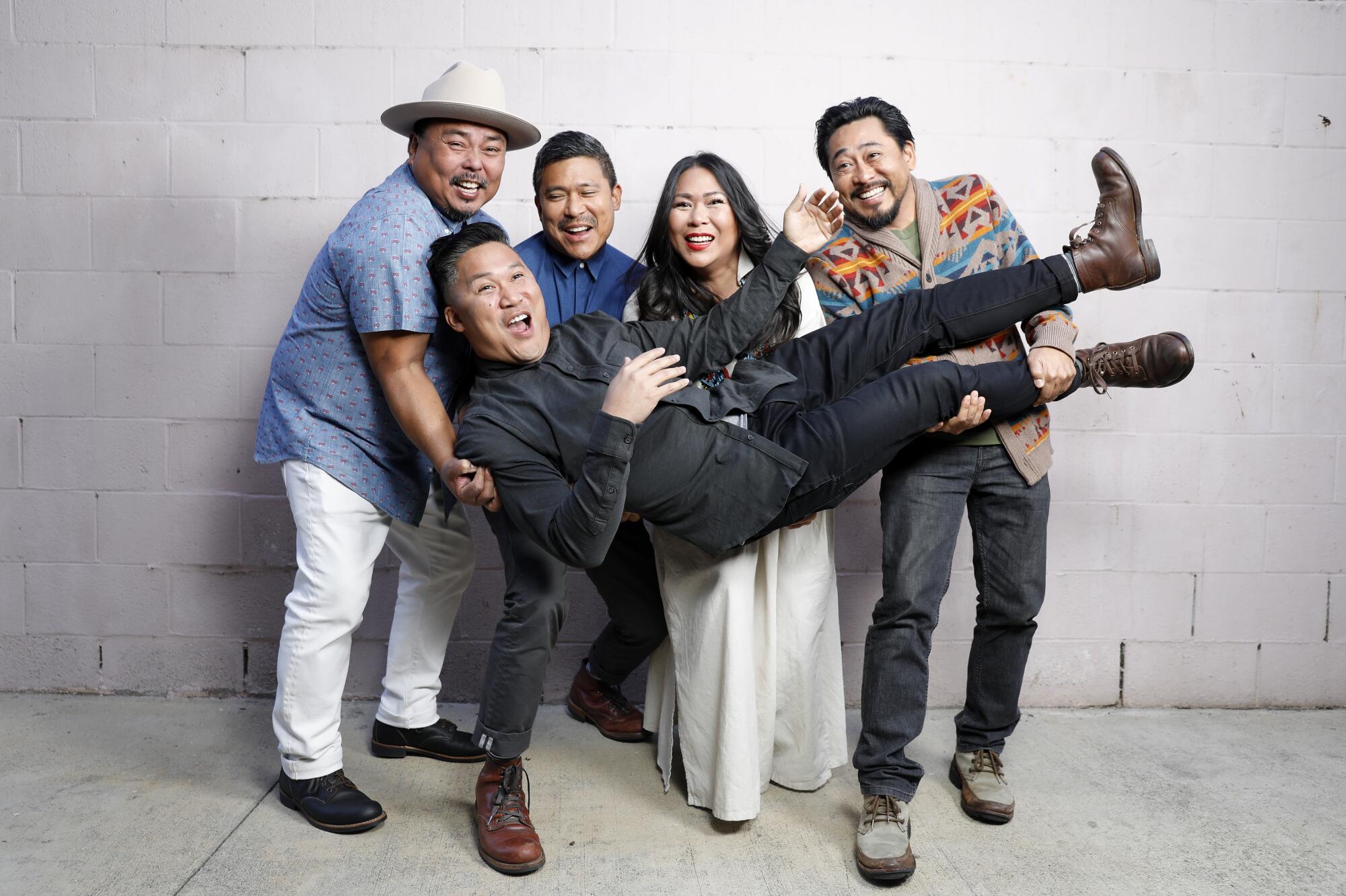
The Basco brothers credit their mother for much of the family’s success, since she was the one who drove them across the Bay Bridge to San Francisco in the ‘80s to perform as child breakdancers and later, to study with the San Francisco Ballet Company. For young boys from Pittsburg, Calif., it was an extraordinary experience — “like being in ‘Harry Potter,’” says Dante — that opened up new worlds of possibility.
“Culturally as kids we were like, ‘Oh, art could be this way,’” said Darion, 47. Eventually the family moved south to Paramount, Calif., where the Basco kids all pursued careers in the performing arts. (The family legacy continues with Derek’s actor daughter, Ella Jay Basco, of the Warner Bros. movie “Birds of Prey.”)
Cast at age 16 by Steven Spielberg in his breakout role in “Hook,” Dante built a steady acting career in TV and film but wouldn’t land a starring role as a Filipino American character until Gene Cajayon’s 2000 indie drama “The Debut,” about a teen artist at a crossroads in his life. As one of the most visible Asian American stars of his generation, the responsibility of representation weighed differently on his young shoulders than it does now, he said.
We no longer have to make movies about the ‘most excellent’ Filipino... These are just regular dudes.
— Dante Basco on ‘The Fabulous Filipino Brothers’
“We no longer have to make movies about the ‘most excellent’ Filipino and that’s the only reason they’re telling this story,” said Dante. “These are just regular dudes. These guys aren’t exceptional at anything.”
Making the film, shot prepandemic in 16 days in two countries and produced by Cignal Entertainment and the Machine, gave the siblings many chances to honor their roots. For a pivotal scene involving Danny and his blind date Teresa (Lapira), the Bascos returned to the Filipino American Association where they gave their first performances as children, telling a story inspired by their own parents’ journey, with friends and family acting in the background.
“That is the origin story of our family,” said Darion. “Our parents were there and various aunts and uncles, so that was very cathartic for them to see and work with us because they didn’t know we were going to be artists. They’re the normal Asian family — they wanted us to be doctors or go into the service, that type of thing.”
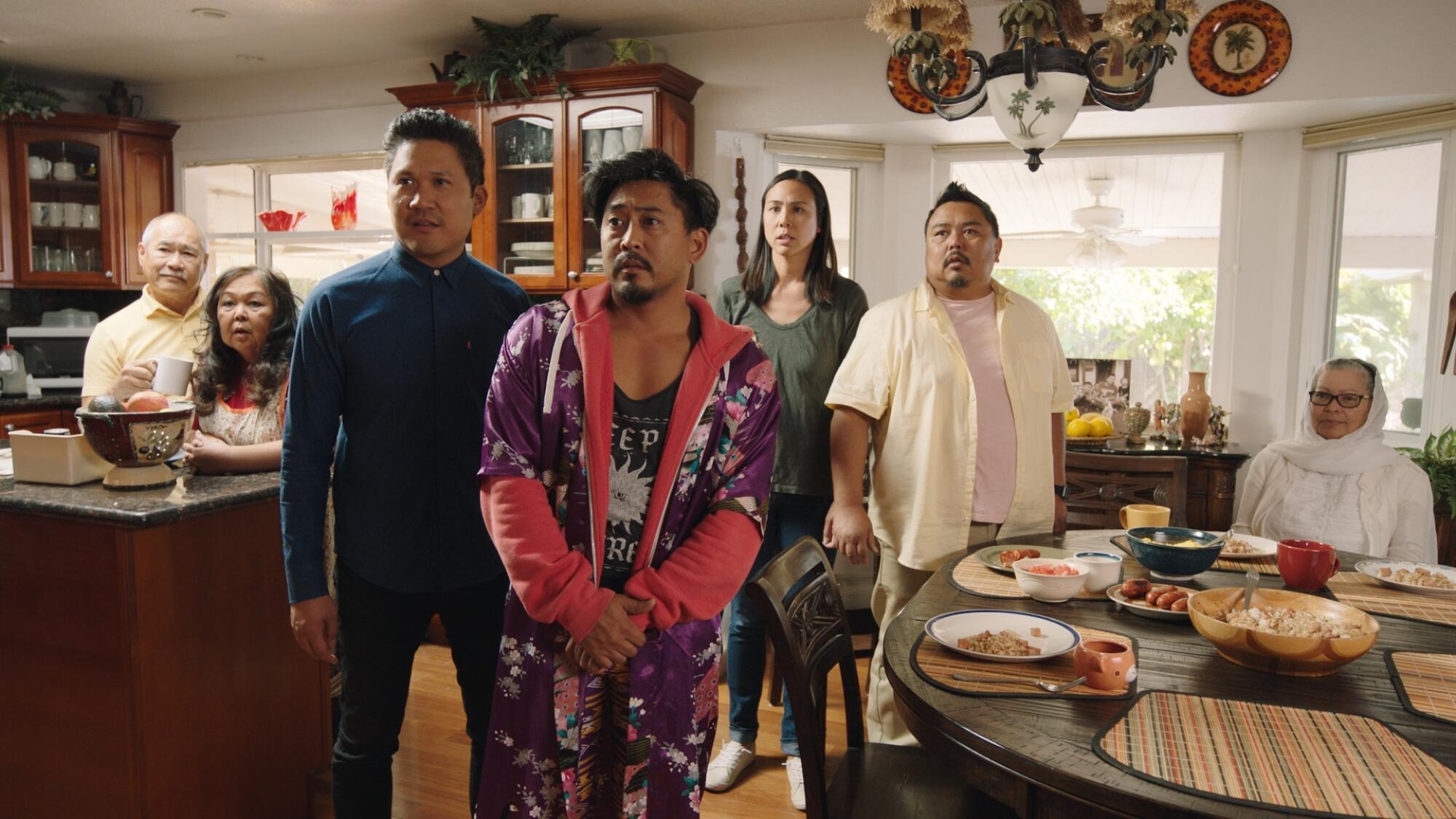
“I just paid off my lifetime membership to my Fil-Am community!” said Dante.
Having landed his own star turns in film and TV, he wanted his brothers to get their leading-man shots. After spending decades acting and training together, he knew Derek, Darion and Dionysio were capable of commanding their own narratives in the kinds of roles still few and far between for nonwhite actors in Hollywood.
“In my career, I’ve had some really great roles that became iconic, and I got to be the lead in certain films, and that’s a certain experience as an actor to get to do,” said Dante. “A lot of stuff we got as character actors, as people of color [were] you come in and steal a scene from the stars of the movie. But on this film, this time it was, ‘This is your movie. You are the guy.’”
In his own segment, Duke visits his parents’ home country for the first time, an experience that shifts his perspective on cultural identity and belonging.
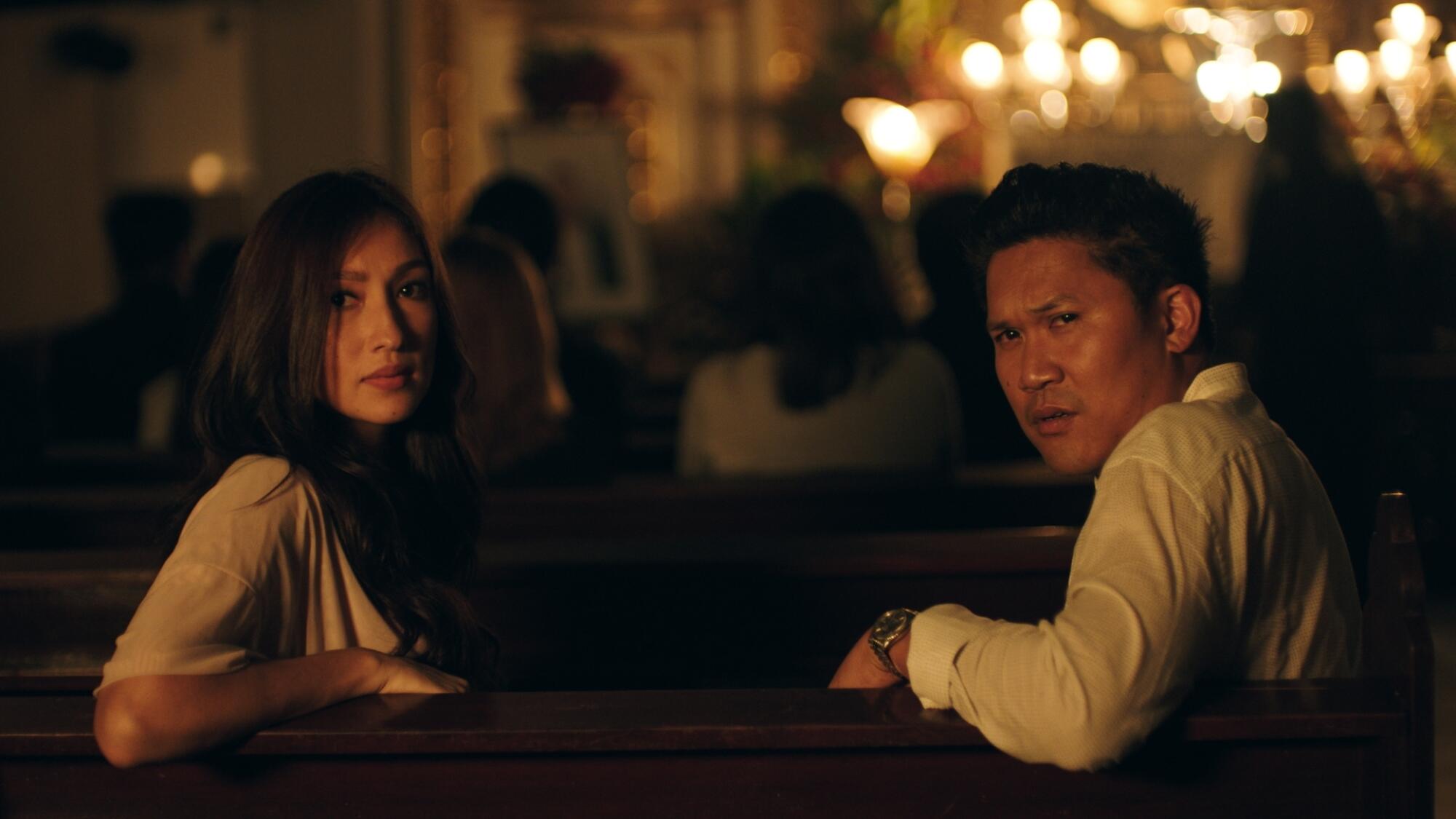
“For me personally that’s the most important thing in that piece,” said Dante. “Here is great. But there’s a connection to someplace else that may have answers to questions that you haven’t even asked yet. It was really important for me to put that in the movie, because I started going back to the Philippines as an adult 10, 15 years ago. The experiences I had going back home were so illuminating about identity and who I am.”
After editing the film in the pandemic and premiering it at last year’s virtual South by Southwest festival, screening it for audiences inspired a new goal: to help create a circuit for independent Asian American filmmakers to connect with audiences hungry for stories that reflect them.
“It’s been crazy that several times people said, ‘This is the realest I’ve seen Filipinos on screen, ever,’” he said. “I have a responsibility to help empower the next generation and set up systems. Maybe that’s how I’ve matured, where I don’t feel like I’ve got to do roles to represent everybody but I have to use whatever projects, whatever platform I have, to help create opportunities that I did not have when I was coming up. And that’s exciting.”
More to Read
Only good movies
Get the Indie Focus newsletter, Mark Olsen's weekly guide to the world of cinema.
You may occasionally receive promotional content from the Los Angeles Times.

